Compounding Pharmacy: Definition, Evolution, and Key Insights
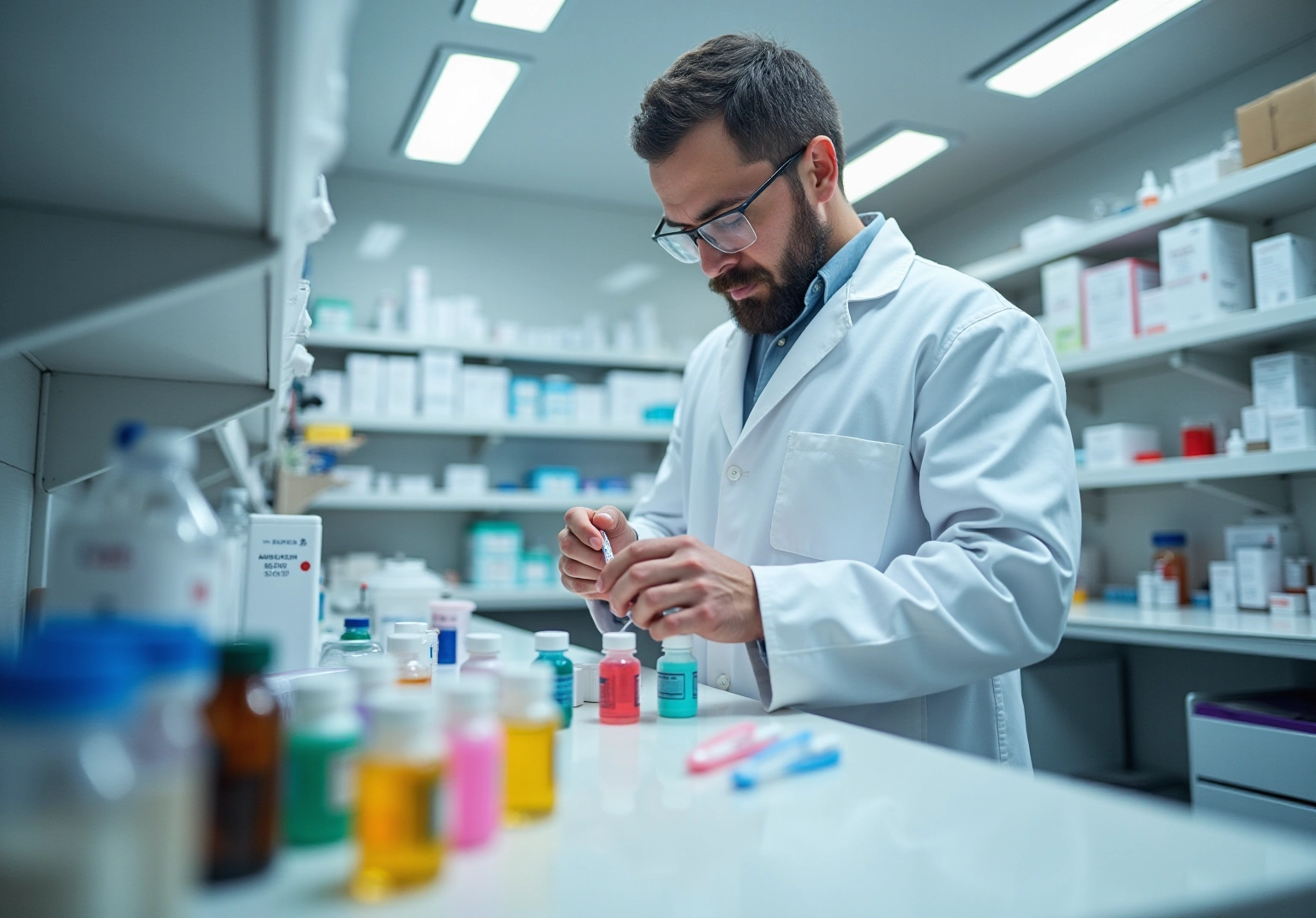
Overview
Compounding pharmacies represent specialized facilities dedicated to the creation of personalized medications that cater to individual patient needs. These tailored solutions may encompass unique dosages, flavors, or delivery methods that are often unavailable in standard pharmacies. The evolution of these pharmacies, from ancient practices to modern healthcare, underscores their vital role in delivering customized treatments. Furthermore, these facilities adhere to stringent regulatory standards, ensuring both safety and efficacy in their offerings.
Introduction
Compounding pharmacies serve a crucial function in modern healthcare by creating personalized medications tailored to the unique needs of individual patients—a practice that traces its origins back to ancient civilizations. As the demand for customized treatments escalates, particularly in domains such as pain management and hormone therapy, these specialized facilities are increasingly acknowledged for their capability to deliver solutions that conventional pharmacies are unable to provide. Yet, this evolution raises an essential question: how do compounding pharmacies navigate the intricate landscape of regulatory standards while ensuring patient safety and the efficacy of their formulations?
Define Compounding Pharmacy: Core Concepts and Functions
Compounding pharmacies serve as specialized units that focus on creating personalized treatments tailored to the unique needs of individuals. Unlike conventional drugstores that primarily offer commercially available medications, these specialized facilities formulate preparations that may not be readily accessible, including , flavors, or delivery methods. This practice is vital for individuals requiring customized treatment options due to allergies, sensitivities, or particular health conditions.
Projections for 2025 indicate that approximately 20% of individuals will benefit from tailored treatments provided by compounding establishments, underscoring their critical role in healthcare. These compounding pharmacies enhance therapeutic options by delivering customized solutions that align with individual health requirements, thereby improving adherence and treatment outcomes.
Pharmacists emphasize the necessity of tailored treatments, asserting that 'compounding may be the only option' for those with specific needs. Moreover, they highlight the importance of addressing misconceptions about compounded drugs, as individuals often harbor concerns regarding their safety and efficacy. This underscores the essential function of specialized medication providers in contemporary healthcare, ensuring that individuals receive the most effective and suitable treatments.
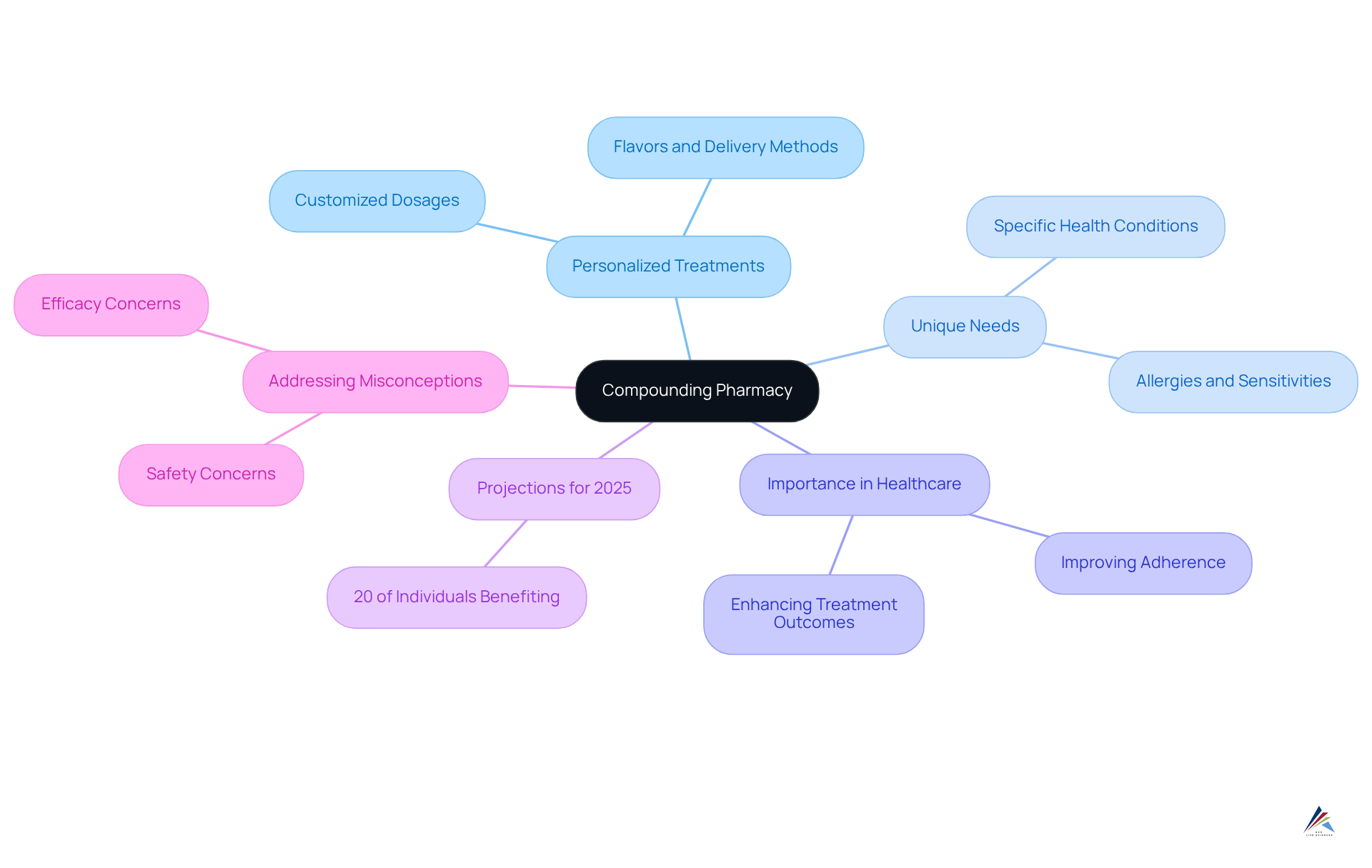
Trace the Evolution of Compounding Pharmacies in Healthcare
The practice of combining ingredients has its roots in ancient civilizations, where pharmacists skillfully mixed and prepared medications tailored to individual patient needs. Over the centuries, this process evolved alongside advancements in medicine and drug formulation. In the early 20th century, the rise of mass-produced medications led to a decline in customized practices, which historically constituted about 1-3% of all prescriptions.
However, the resurgence of personalized medicine in recent decades has revitalized the role of customized medication providers. Today, these providers are recognized for their capacity to deliver tailored solutions, particularly in critical areas such as:
- Pain management
- Hormone replacement therapy
- Pediatric care
Leading expert Outterson underscores the necessity for healthcare practices to source exclusively from specialized laboratories that adhere to Current Good Manufacturing Practices (CGMP) standards. This evolution highlights the importance of specialized medication providers in addressing the diverse needs of patients in contemporary healthcare, while also revealing the significant challenges they face, including:
- Contamination
- Concentration errors that can jeopardize patient safety
Moreover, ongoing continue to influence the pharmacy landscape, underscoring the need for a steadfast commitment to high standards and safety protocols.
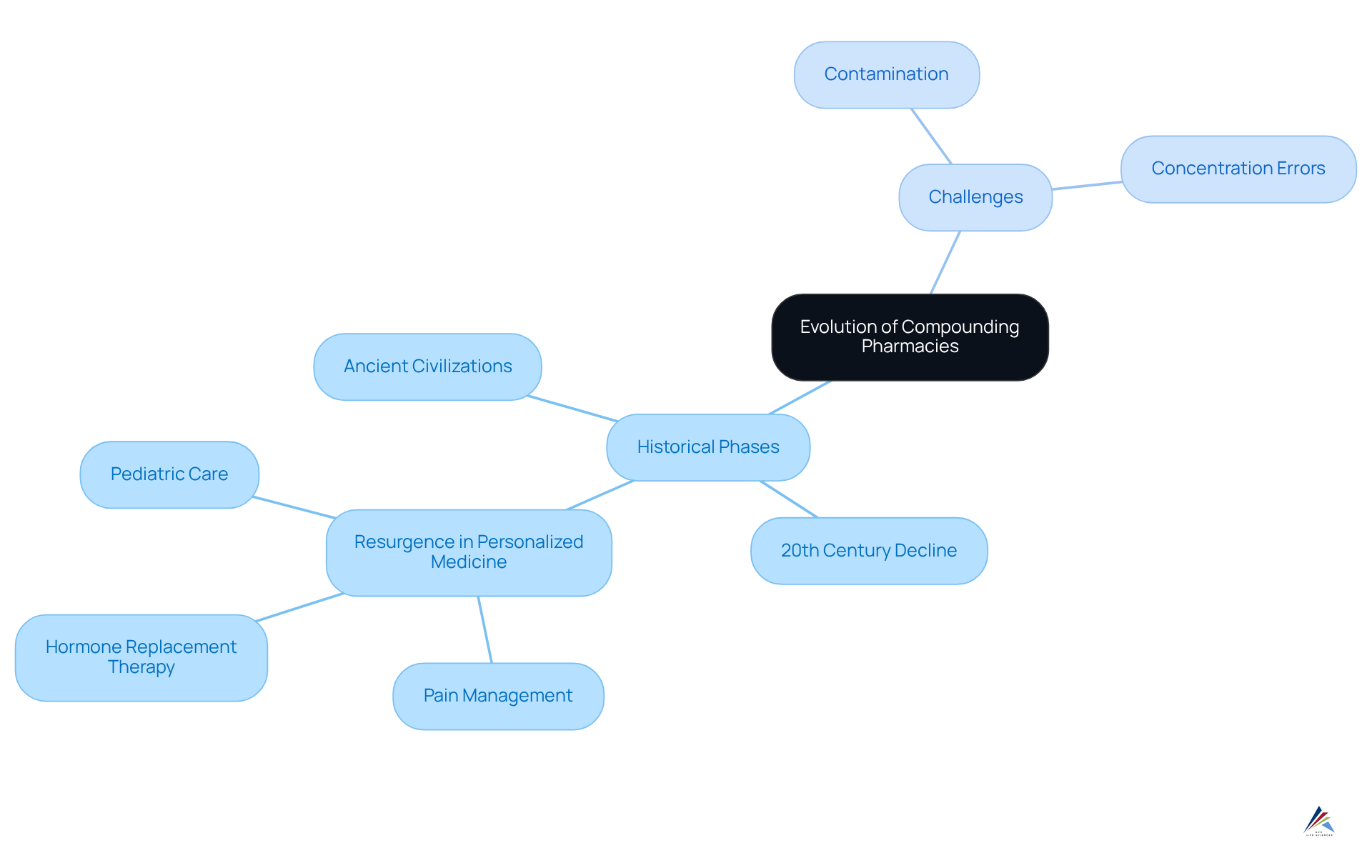
Identify Types of Compounded Medications and Their Uses
Compounded formulations made by a compounding pharmacy can be classified into various types, notably sterile and non-sterile preparations. Sterile preparations are crucial for:
- Injectable treatments
- Ophthalmic solutions
- Other applications that necessitate aseptic techniques
In contrast, non-sterile compounding encompasses formulations such as:
- Creams
- Ointments
- Capsules
- Flavored liquids
Typical applications of a compounding pharmacy include:
- Creating dosage forms for young individuals who may struggle with swallowing pills
- Formulating hormone replacement treatments tailored to specific hormonal needs
- Providing pain management solutions that integrate multiple active components into a single formulation
These personalized therapies ensure that patients receive the most effective treatment, meticulously adapted to their unique health conditions.
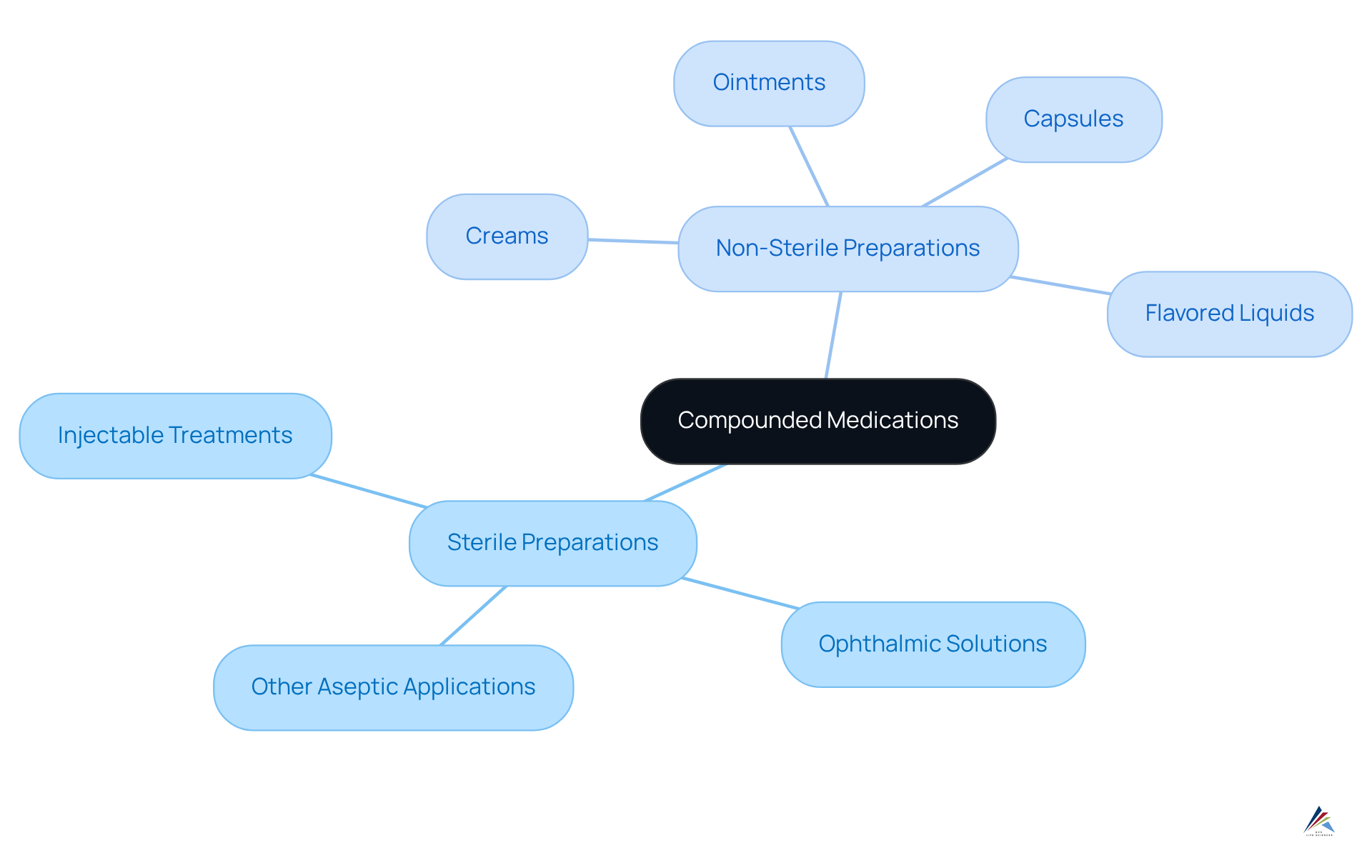
Examine Regulatory Standards and Compliance for Compounding Pharmacies
Compounding pharmacies operate under stringent regulatory standards that are designed to ensure the safety and effectiveness of compounded medications. In the United States, oversight is provided by the Food and Drug Administration (FDA) alongside state medication boards, which enforce adherence to established guidelines. Central to these regulations are the United States Pharmacopeia (USP) standards, specifically USP <795> for non-sterile preparation and USP <797> for sterile preparation. These guidelines detail essential factors such as the quality of ingredients, formulation processes, and facility standards, ensuring that drugstores follow best practices.
Compliance with Good Manufacturing Practices (GMP) is vital for minimizing risks associated with compounded medications. The FDA has reported that many inspected human drug compounders not registered as outsourcing facilities were found non-compliant with Section 503A, underscoring the necessity for stringent adherence to these standards. Regular inspections and audits serve as critical components of the regulatory framework, functioning to ensure that pharmacies maintain high standards of quality and safety. This oversight ultimately and well-being, reinforcing the importance of strict adherence in the preparation sector.
Recent statistics indicate that approximately 60% of states expressed satisfaction with their communication with the FDA regarding formulation practices; however, challenges persist. For instance, half of the states do not perform regular inspections of 503A preparation facilities, resulting in inconsistency in compliance and enforcement. Furthermore, the 503A U.S. formulation establishments market is projected to reach USD 8.08 billion by 2034, emphasizing the sector's growth and significance. Examples of compounding pharmacies that effectively adhere to USP guidelines demonstrate the effectiveness of these standards in promoting patient safety and quality assurance. The 2012 fungal meningitis outbreak from NECC serves as a critical reminder of the necessity for stringent regulatory compliance in this sector.
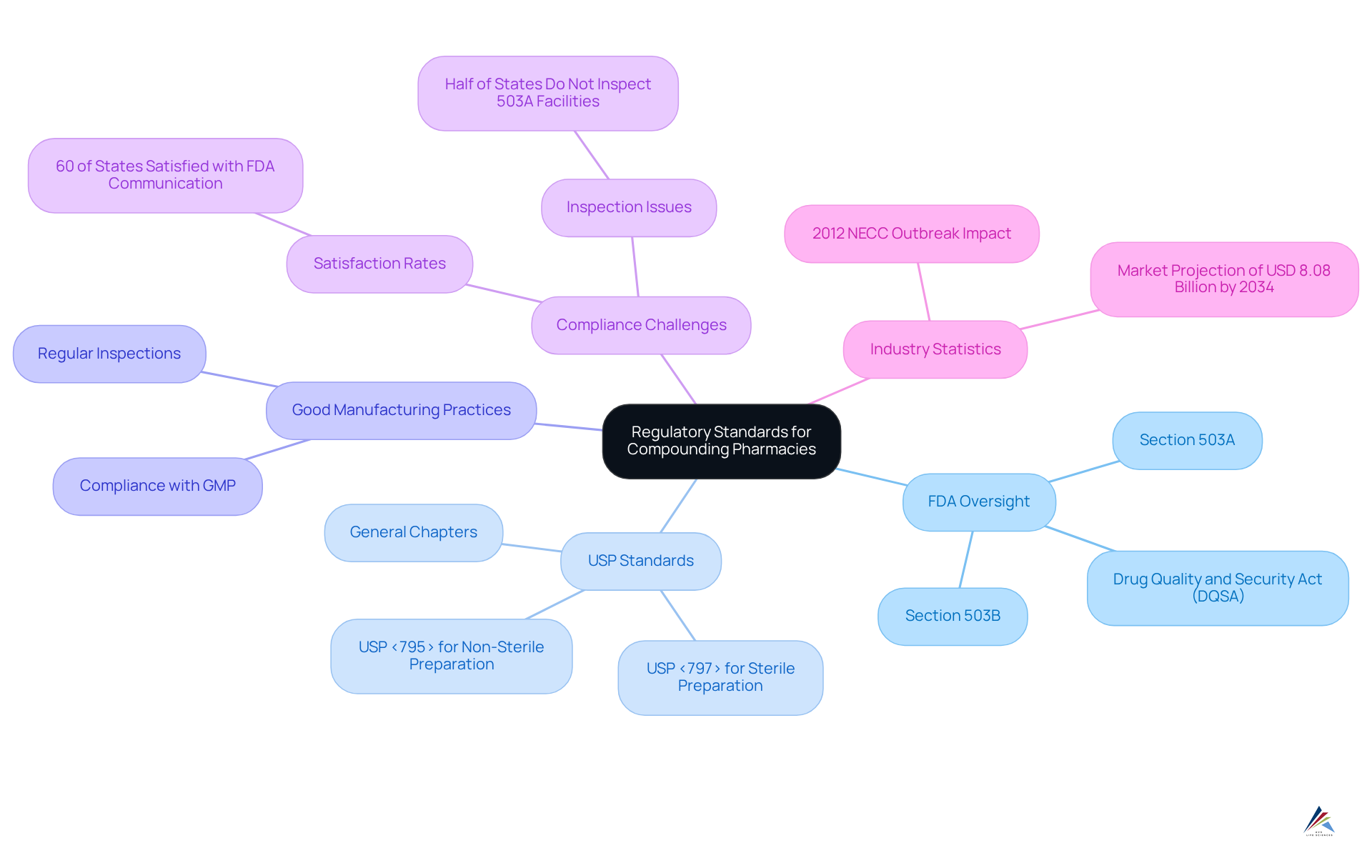
Conclusion
Compounding pharmacies play an essential role in modern healthcare by creating personalized medications tailored to meet the specific needs of individuals. These specialized facilities fill a critical gap in the healthcare system, providing solutions that are often unavailable through conventional pharmacies, thus ensuring that patients receive the most effective treatments for their unique health conditions.
Throughout the article, key insights into the evolution, types, and regulatory standards of compounding pharmacies were explored. The historical context reveals a resurgence in the importance of customized medication, particularly in areas such as pain management and hormone therapy. Furthermore, the discussion on regulatory compliance highlights the necessity for strict adherence to safety standards, which is crucial for maintaining the quality and effectiveness of compounded medications.
The significance of compounding pharmacies cannot be overstated. As the demand for personalized medicine continues to grow, it becomes increasingly important for healthcare providers and patients alike to understand the benefits and regulatory frameworks surrounding these specialized services. Embracing the advancements in compounding pharmacy can lead to better health outcomes and ensure that all individuals have access to the tailored treatments they need.
Frequently Asked Questions
What is a compounding pharmacy?
A compounding pharmacy is a specialized facility that creates personalized medications tailored to the unique needs of individuals, unlike conventional drugstores that offer commercially available medications.
Why are compounding pharmacies important?
Compounding pharmacies are important because they provide customized treatment options for individuals with allergies, sensitivities, or specific health conditions, improving adherence to treatment and overall health outcomes.
What types of preparations do compounding pharmacies create?
Compounding pharmacies create preparations that may include specific dosages, flavors, or delivery methods that are not readily available in standard drugstores.
What is the projected impact of compounding pharmacies by 2025?
By 2025, it is projected that approximately 20% of individuals will benefit from tailored treatments provided by compounding pharmacies.
What do pharmacists say about the necessity of tailored treatments?
Pharmacists emphasize that for some individuals with specific needs, 'compounding may be the only option' to receive appropriate medications.
What misconceptions do people have about compounded drugs?
Many individuals harbor concerns regarding the safety and efficacy of compounded drugs, highlighting the need for addressing these misconceptions.
What role do compounding pharmacies play in contemporary healthcare?
Compounding pharmacies play a critical role in contemporary healthcare by ensuring that individuals receive the most effective and suitable treatments tailored to their specific health requirements.
